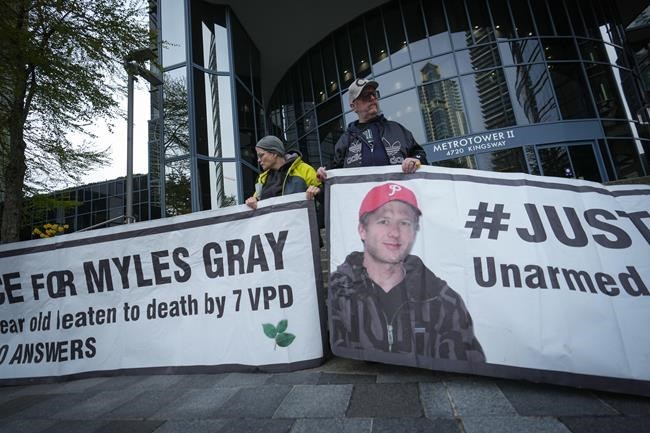BURNABY, sa国际传媒 — A Vancouver police constable told a coroner's inquest that "time was standing still" as he waited for advanced life support paramedics to arrive and help revive 33-year-old Myles Gray after he was beaten by officers trying to arrest him.
Const. Derek Cain described to the jury on Friday their efforts to resuscitate Gray, who stopped breathing twice in the minutes after police handcuffed him.
Cain said he arrived in the yard where police were struggling to subdue Gray in response to a call for backup on the day the man died in August 2015.
Gray had been in Vancouver making a delivery to a florists' supply shop for the business he operated on the Sunshine Coast, and the inquest has heard the initial 911 call was about an agitated man who sprayed a woman with a garden hose.
The beating left Gray with injuries including a fractured eye socket, nose and rib, a crushed voice box and ruptured testicles.
Cain testified that Gray was sweating profusely, he wasn't communicating normally, and he displayed "superhuman" strength that left the officer in "disbelief."
Gray's symptoms suggested the officers weren't dealing with someone who simply didn't want to be arrested, said Cain, who had previously worked as a paramedic.
The officer said he assessed the situation as "excited delirium," describing it as a life-threatening medical emergency that required immediate intervention.
It wasn't an option to let Gray walk away, he told the jury in Burnaby, sa国际传媒
Earlier this week, Coroner Larry Marzinzik provided the jury with what he called a "cautionary note" about the term excited delirium.
To his knowledge, Marzinzik said it's not recognized as a cause of death by most pathologists. The jury members should put less weight on the evidence of a lay person on the topic and would be hearing from a medical expert later, he said.
With Gray in handcuffs, Cain said he called for advanced life support paramedics, who are specially trained and carry equipment required to administer sedatives.
Cain's communication with Gray changed from telling him he was under arrest to saying help was on the way, the officer said.
"I made numerous requests over the radio," Cain said. "I asked for a supervisor to go to the hospital and pick up one (advanced life support) paramedic with his drug kit and come and help. It's the only thing that could have helped."
Then, Gray let out a deep sign and stopped breathing, Cain said.
He said he moved Gray into a sitting position and rubbed his sternum. Within a few seconds, he said Gray started breathing and tensing his muscles again.
Cain said he and another officer moved Gray out from under low-hanging tree branches to make room for him to receive medical attention, but he stopped breathing again a few moments later.
He said he told other officers to remove Gray's handcuffs and yelled at firefighters to bring their automatic defibrillator, airway equipment and oxygen, while another officer performed chest compressions.
Their efforts to revive him were not successful, he said.
"I truly believed in all my heart that we would bring him back," Cain told the inquest.
"I've had nightmares about this call for seven-and-a-half years," he said.
Cain also told the inquest that a police union representative told him not to make handwritten notes after the incident, echoing testimony the jury heard from two other officers on Thursday.
Later on Friday, Det. Const. Beau Spencer testified that a senior union representative also told him not to make any handwritten notes directly after Gray's death. He said he does not recall who gave him the instruction.
Spencer said he arrived at the scene of the struggle with Cain, his patrol partner.
He told the inquest he recalled that Gray had a sudden "moment of clarity" after the officers had moved him from beneath the tree.
He said Gray looked him in the eye and said something like, "What is going on?"
Spencer said he told Gray he'd been in a fight with police and an ambulance was on its way, but Gray began struggling again before going limp.
The officer testified that Gray's face was swollen, especially around his eyes.
Several additional Vancouver police officers and paramedics are expected to testify at the inquest that began Monday with testimony from Gray's sister, Melissa Gray.
She described her brother as goofy and kind, saying he'd been diagnosed with bipolar disorder in high school, around 1999, but he'd been stable ever since.
The coroner's jury won't be able to make findings of legal responsibility but may make recommendations to prevent similar deaths in the future.
The BC Prosecution Service announced in 2020 that charges would not be approved against the officers, saying police were the only witnesses to the incident and the Crown couldn't prove any offence had been committed.
This report by The Canadian Press was first published April 21, 2023.
Brenna Owen, The Canadian Press



